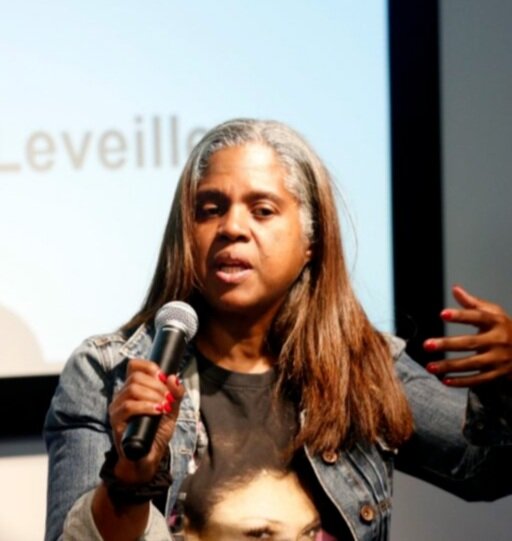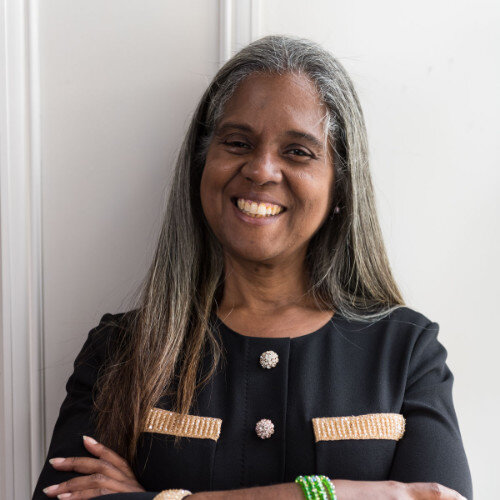Genevieve Leveille is the Principal Founder and CEO of agricultural-focused blockchain systems provider, AgriLedger, and has over 25 years’ experience working with large corporations and banks in financial supply chain optimisation. She is a speaker on fin-tech, financial supply chain, disruptive technologies, and is widely considered an authority within the realm of digital identity and financial transformation.
Genevieve is the Principal Founder and CEO of AgriLedger. AgriLedger enables trust, transparency and traceability through blockchain across the agricultural supply chain. Genevieve led a collaboration with Haiti’s Ministry of Commerce and Industry to deliver a Distributed Ledger Technology (DLT) pilot sponsored by the World Bank. The project went live in May 2020 allowing Haitian fruit farmers and consumers to reap the benefits of fairer prices and improved food security.
Genevieve has received several awards in recognition of her work. She was nominated by the Financial Times to the top 100 BAME in UK technology in 2019, named a winner of the ComputerWeekly 2020 Women in Software and was one of the top 5 finalist for Quesnay’s Female Founders in FinTech in 2019. A finalist in the Women in IT Awards 2016 (Security Champion, and listed in Innovate Finance’s ‘Women in 2016/17 Fintech Power List’.
She is vice-chair of TechUK’s Distributed Ledger Technologies Working Group, which provides strategic direction for all UK activities related to DLT. She is an inaugural member of the Advisory Group for the Estonian Government’s eResidency initiative, and an Advisory Board Member at Resurgence, an award-winning global design, communications and consulting company that specialises in urban climate risk and resilience.
Genevieve has spoken on emerging technologies at numerous conferences and engagements globally and is fluent in English, French, Haitian Creole and Spanish.
Firstly: what’s daily your routine that sets you up for success?
I’m an early riser but I need quiet time. I take time to scour the internet, read emails, blogs and seek out information. It’s really important to keep current and always learning. I don’t absorb information as well in the afternoon and evening. I actually use technology to block out my time.
You’ve had quite the varied career! How would you describe what you do?
I’m a scientist and a tinkerer. I’m a solutions person, as anyone in tech should be. Part of that entails reading the information that’s out there, connecting with others. Listen to what others are saying.
Science gives you the ability to identify the facts, the starting point and what you get at the end. Then you can answer the question: what happens in between?
When we build tech, we expect certain outputs. But there are people in between who act or react in a certain way which may change the results you expected. Understanding how people are going to use and react to a product is very important.
Don’t think of yourself as just a technologist. Your understanding of human behaviour and cultural norms is critical.
So how do you see the relationship between humans and tech?
As women, we talk a lot about how tech has not been designed for us. It’s beyond that. Often the usability factor has not been thought about, such as how we will react to the technology. Is there a need for it? What’s in it for us?
One of my logos that I love is a ‘0’ with an ‘8’ in the middle. The ‘8’ represents a person and the ‘0’ zero represents the tech that surrounds humans. Technology supports humans.
What do you think are the universal challenges that women in tech face?
Too many women come up with great ideas and then see them be taken on by someone else. Throughout history women’s ideas and contributions to technology have been forgotten.
I’ve personally been encouraged by men and women alike to let go of some of my ideas. We need to fight for and be empowered to fight for what is ours. Women have so many great ideas but so often, someone else takes it on and we are programmed to just let go.
Marie Curie, Ada Lovelace and Katherine Johnson, Mary Jackson and Dorothy Vaughan – the three black female mathematicians who worked at NASA during the Space Race. These are just some well-known examples of women’s contributions to tech that have been dismissed over the years.
Do you think soft skills are also important in tech?
For sure. Don’t get me wrong – I know how to code, but that’s not what I get enjoyment from. In the same way – I know how to write but I don’t get enjoyment from writing all day.
I’m a better editor than I am a writer. The same applies for coding and technology. Understand your limitations. It’s definitely important to know what coding is all about – what does it involve, what does it look like, what does good and bad look like?
Women should aim to be the ‘coders’, but also- aim to be the ‘bosses’! To be at the top and be making significant decisions, you can have a broad understanding of technology.
I encourage women to learn how to code, but not always to be coders. Unless that’s exactly what makes you happy!
Who inspires you in technology at the moment?

The CTO of Monzo: Meri Williams. She is loud and proud! She is a self-certified geek.
How do we get more female geeks into senior positions?
We need to embrace women’s geekness… and encourage women to embrace it, too! If you’re a mathematician or a scientist spending must of the day in a lab, you don’t need to care about your appearance.
But society tells us, as women, we need to look a certain way. And so, we devalue ourselves. I was always told: “what’s most important is between your two ears”. What’s in your brain is what is going to get you ahead, or it should – anyway”. It’s all about self-assurance.
So how do you think imposter syndrome plays into women’s tech careers?
I understand the concept of imposter syndrome but I’m totally against giving it validity. You have to own what you know and what you don’t. You can teach yourself just about anything. If you can’t get it, you can seek people who have that knowledge.
Use LinkedIn to follow people, introduce yourself and learn from them.
When you don’t have anything, and you’re living in a poor country – you don’t have time to feel like an imposter. Or to second guess yourself. You just get on with things and let things happen. You either empower yourself or stay where you are. But you’re less likely to feel “I’m not worthy”. It’s worth bearing that in mind.
My Mother used to always say – you need to know the value of yourself. Have a clear view of your personal value. Do not let others devalue you. Thinking this way will mean you never let someone else give you less value than what you’re worth.

Is “skilling up” the way to go, for women aiming to become leaders?
Well, it’s important to remember: you don’t get jobs based on skills alone. It’s based on human connection, too. It’s about how you interact with people and the connections you create.
When it comes to interviewing for leadership roles, or even in general – it’s so important to prepare. Find out information on the company and its people. Find ways to ensure you can connect with that person. You have to be able connect with someone to be able to work with them. If you’re not able to create that connection – it’s probably not the job for you anyway.
How do you think we can get more women recognised for their contributions to tech?
Interestingly, until creating Agriledger I wasn’t bothered about recognition. What’s more important is knowing that the technology solution that I implemented was successful. Waving a flag, demanding recognition won’t get me anywhere.
Male success often depends on recognition. I personally have received recognition, but I don’t need it. As long as you know your boss has your back, that’s what really matters.
Remember: your recognition is in your paycheck! That’s what you should care about.
But! Validate yourself. Hold your own. As you are of course up against many who will shout louder.
Don’t ask for permission to have a voice.
Be clear, concise, know what you’re talking about when you speak.
Don’t bring up problems, unless you have an idea of how to fix it. Always give three choices: do nothing, 2 alternative ways of dealing with. Have an understanding of the time and money implications of fixing it.
You may not have all the answers, but you can collaborate with the right people to get those answers. This will help build your confidence.

What’s advice would you share with women in tech today?
Don’t wait for permission
Just get it done. Get it done wrong? That’s fine. We’ll fix it. Women are often waiting for someone to give them permission. You can always frame questions as suggestions.
Manage your manager
I’ve done this throughout my whole career. I’ve managed them rather than the other way round. Demand that 1-1 time. Keep it regularly scheduled. You need to share the successes and failures with your own team.
Follow Genevieve Leveille on Linkedin,








